Navigating Motorcycle Crash Legal Battles
Handling the aftermath of a motorcycle crash encompasses more than just the physical recovery; it involves a complex legal journey marked by the need to establish fault, collect evidence, and seek fair compensation. The intricacies of this process, from understanding the principles of legal responsibility to engaging in settlement negotiations, require not just a basic knowledge of the law but a strategic approach to litigation. As we explore the critical steps involved in this legal battle, one must consider the pivotal role of skilled legal representation in tilting the scales of justice in favor of the victim. What then, are the specific strategies and evidentiary requirements that can make or break a case in this highly specialized area of law?
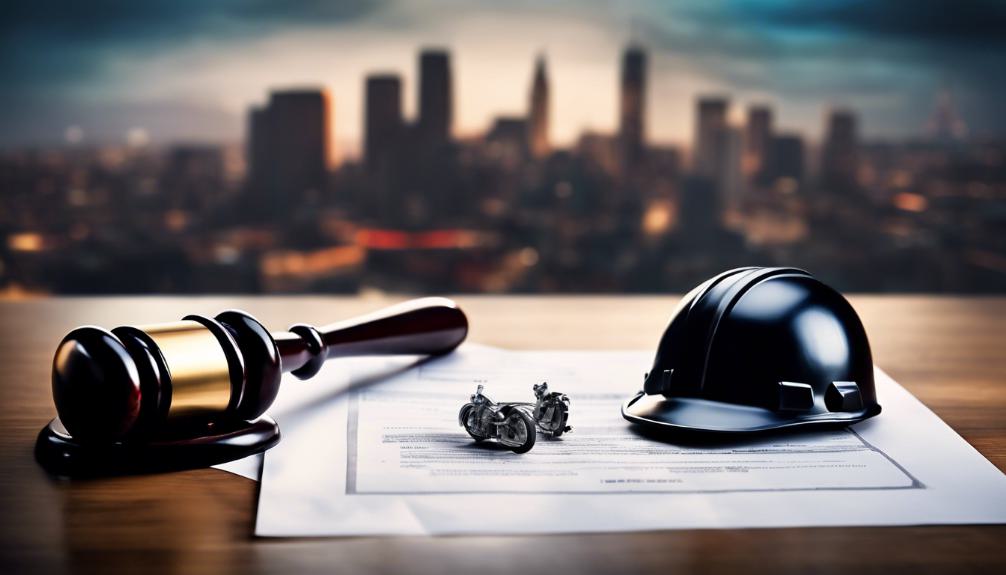
Key Takeaways
- Determining fault in motorcycle accidents requires proving a breach of duty of care by another motorist or entity.
- Victims can file lawsuits based on evidence of negligence, such as speeding or distracted driving, to seek compensation.
- Settlements often depend on factors like accident severity and the clarity of fault, with many cases resolving outside of court.
- Legal representation significantly enhances the chances of securing a favorable outcome in motorcycle accident lawsuits.
Understanding Legal Responsibility

In the domain of motorcycle accidents, determining legal responsibility hinges on the critical assessment of whether a motorist has breached their duty of care towards others on the road. This duty encompasses a range of behaviors, including adherence to traffic laws, maintaining a thorough following distance, and ensuring one's vehicle does not pose a hazard. Legal responsibility, beyond drivers, may extend to non-drivers such as manufacturers or entities responsible for road design and maintenance, should defects or negligence contribute to an accident. Legal responsibility, beyond drivers, may extend to non-drivers such as manufacturers or entities responsible for road design and maintenance, should defects or negligence contribute to an accident. In legal terms, the principle of duty of care is paramount, providing the foundation upon which fault is evaluated. Judges or juries typically adjudicate responsibility in lawsuits, where victims bear the burden of proving fault. This underscores the necessity for in-depth evidence demonstrating a violation of the duty of care.
Fault Determination Process
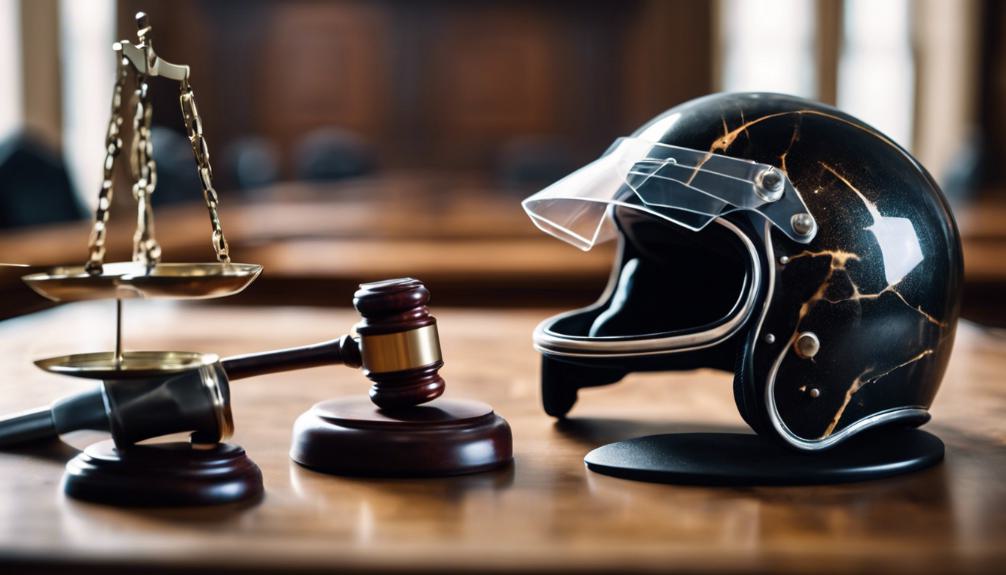
Determining fault in motorcycle accidents requires a thorough analysis of evidence to ascertain whether a breach of duty of care occurred. This process involves scrutinizing the actions of all parties involved, including drivers, manufacturers, and even entities responsible for road design and maintenance. It's not solely about identifying who caused the accident but understanding how their actions or negligence contributed to the event. In many instances, fault is not clear-cut, requiring detailed investigation and sometimes reconstruction of the accident scenario. The evidence plays an important role, encompassing everything from eyewitness testimony to traffic camera footage and accident reports. This meticulous approach important that all factors are considered before attributing responsibility, an important step before any legal action related to the accident can proceed.
Filing a Lawsuit
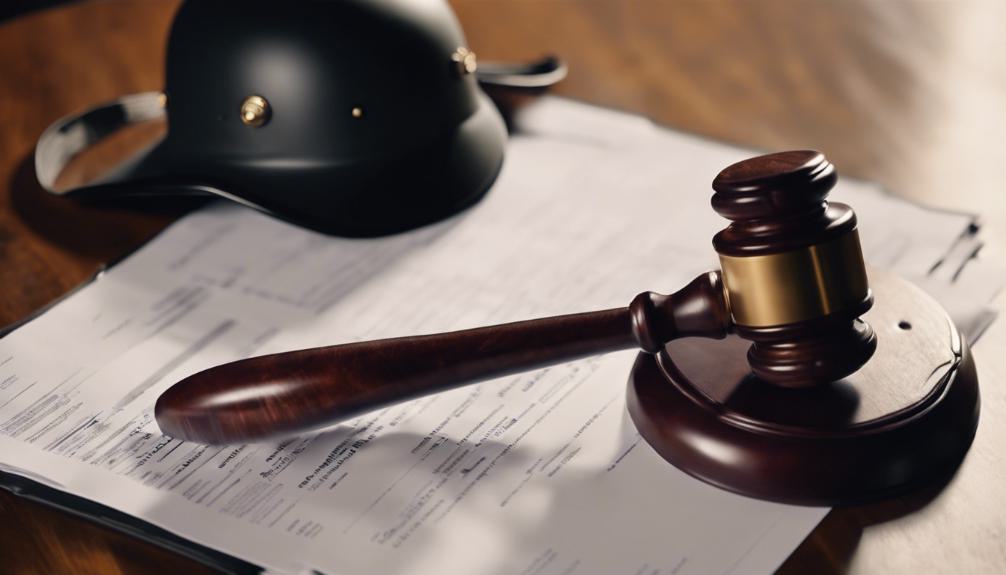
Understanding the process of fault determination lays the groundwork for victims of motorcycle accidents to take the next step: filing a lawsuit to seek compensation for their injuries and losses. This legal action is predicated on the principle that every driver owes a duty of care to others on the road, and violations of this duty can result in liability. When initiating a lawsuit, the victim must substantiate claims that another party's negligence or wrongdoing directly contributed to the accident. This involves demonstrating how the defendant failed to uphold their duty of care, leading to the crash. It's not limited to other motorists—manufacturers or entities responsible for road design can also be held accountable. Successfully filing a lawsuit requires a thorough understanding of legal principles and the ability to effectively argue the case in court.
Crucial Evidence Collection

Gathering evidence is the cornerstone of building a successful motorcycle accident lawsuit, requiring meticulous attention to detail and thorough documentation. Essential evidence includes photos or videos of the accident scene, which can capture important details like road conditions, vehicle positions, and any obstructions or defects. Witness statements can provide independent accounts of the incident, adding credibility to the victim's claims. Medical records are imperative, documenting injuries directly resulting from the accident and their impact on the victim's life. Additionally, police reports offer an official assessment of the accident, possibly noting any violations of traffic laws. Collecting these pieces of evidence promptly assures they are accurate and untampered, forming a strong foundation for the lawsuit.
Settlement and Negotiation Factors
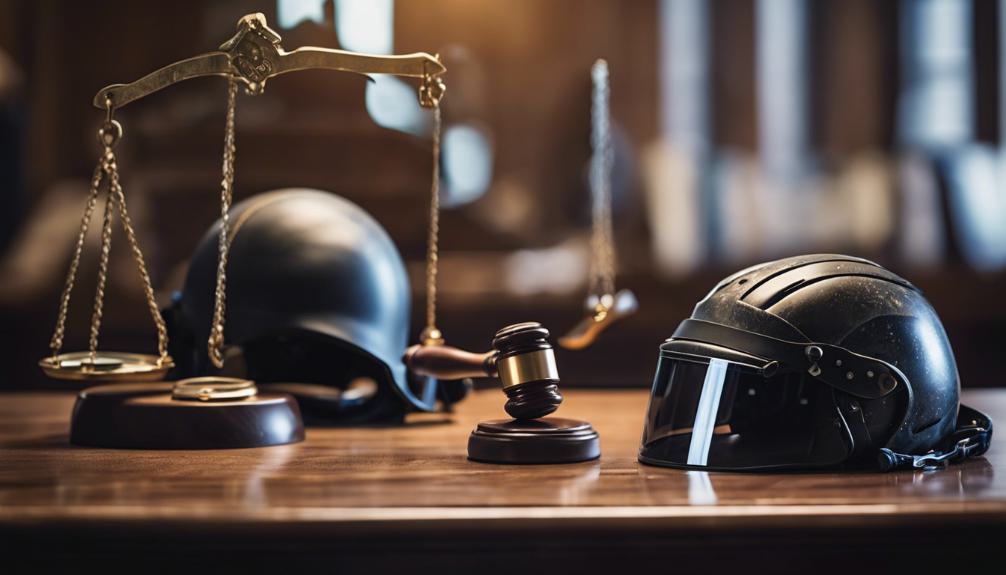
Several factors influence the settlement and negotiation process in motorcycle accident lawsuits, including the severity of injuries, the clarity of fault, and applicable insurance policy limits. The more severe the injuries, the higher the potential settlement, as it reflects the extent of medical expenses, lost wages, and pain and suffering endured by the victim. Clear fault, supported by strong evidence, strengthens the victim's position in negotiations. Insurance policy limits also play a critical role; settlements often hinge on what the policy can cover. Understanding these factors is essential for victims seeking fair compensation. Legal representation can adeptly navigate these complexities, leveraging evidence and legal precedents to argue for the best possible outcome for the victim.
Defending Against Accusations

While negotiating settlements is a key aspect of motorcycle accident lawsuits, effectively defending against accusations is equally important for those alleged to have caused the accident. In the complex arena of motorcycle crash legal battles, the accused parties must meticulously challenge the claims of negligence or breach of duty of care. This involves presenting clear evidence and constructing a robust legal argument that demonstrates either the absence of negligence or mitigating circumstances that contributed to the accident. Legal defenses often hinge on disproving the accuser's evidence or showcasing alternate causes for the accident. Success in defending against accusations not only requires a deep understanding of traffic laws and legal precedents but also the strategic use of evidence to counter the plaintiff's claims.
Motorcycle Defects Liability
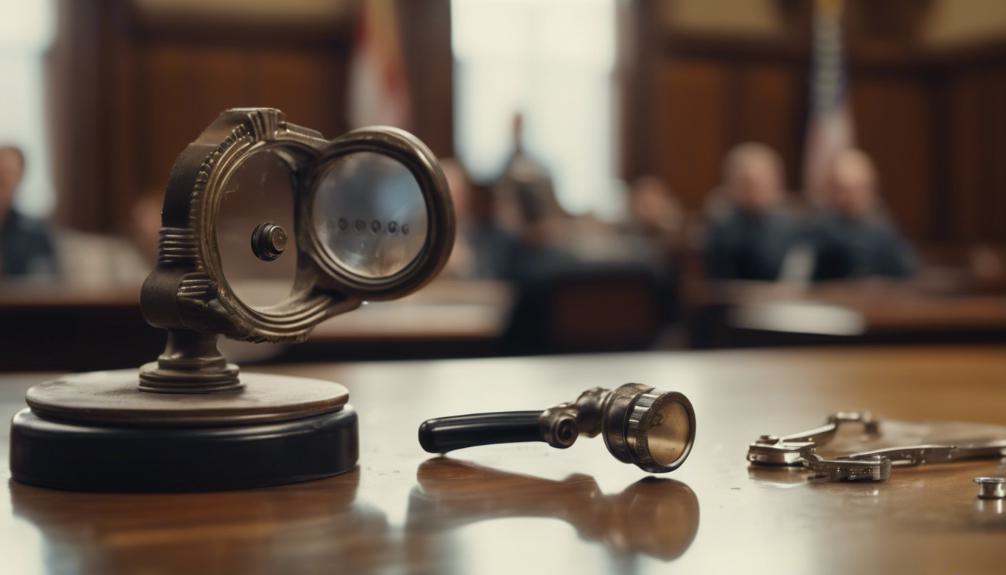
In cases of motorcycle accidents, liability can extend to manufacturers when defects in the design or production of the motorcycle contribute to the crash. This facet of liability, known as product liability, posits that manufacturers are responsible for ensuring their products are free from defects that could harm users. Victims can file claims for compensation if they can prove that a defect in the motorcycle, such as faulty brakes or a flawed engine design, directly led to their accident. The legal principle underlying these claims is that manufacturers must bear the cost of injuries resulting from their failure to provide a safe product. Pursuing such claims requires a detailed investigation into the motorcycle's design, manufacture, and the specific failure that caused the accident, highlighting the product's role in the event.
The Role of Legal Representation
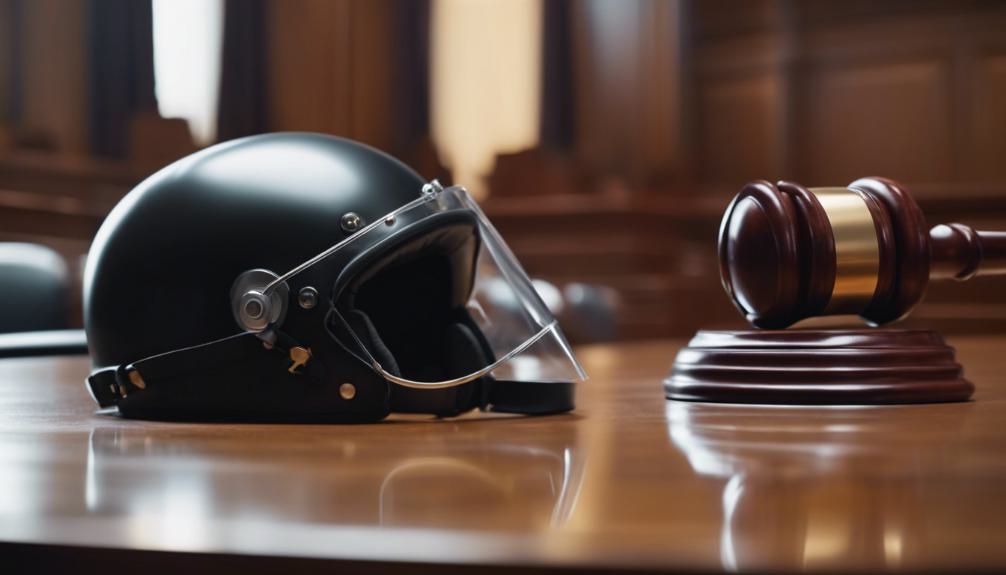
Handling the complexities of motorcycle accident lawsuits necessitates the expertise of skilled legal representation to guarantee victims secure the compensation they deserve. Legal professionals specializing in this field possess the knowledge to navigate the intricate legal landscape, including the determination of fault, collection of evidence, and negotiation of settlements. They play a critical role in addressing the challenges that come with establishing another party's negligence, whether it's a distracted driver, a manufacturer of a defective motorcycle part, or an entity responsible for unsafe road conditions. Providing strategic advice, these attorneys make certain that all legal bases are covered, from filing the lawsuit within the statute of limitations to presenting a compelling case that highlights the full extent of the victim's losses, thereby maximizing the potential for a favorable outcome.
Trial Duration and Outcomes
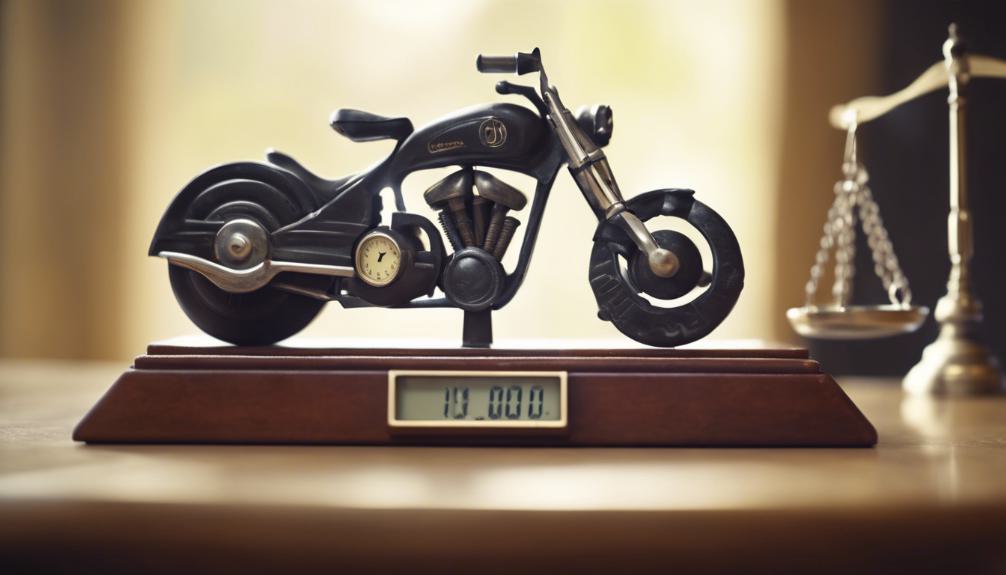
The duration of a motorcycle accident trial can greatly vary, often depending on the complexity of the case and the backlog of the court system. Trials might last a few days for straightforward cases, but more intricate ones, involving multiple parties or severe injuries, could extend over several weeks or months. Outcomes are equally variable, hinging on evidence, legal arguments, and how convincingly fault and damages are demonstrated. Winning a case could result in compensation for medical expenses, lost wages, and pain and suffering, but there is no guarantee of success. Defendants may also appeal a decision, potentially lengthening the legal battle. Understanding these dynamics underscores the importance of experienced legal representation to navigate the uncertainties of trial proceedings effectively.
Frequently Asked Questions
How Does the Helmet Law Affect My Motorcycle Accident Lawsuit?**
Helmet laws can greatly influence motorcycle accident lawsuits, potentially affecting fault determination and compensation. Compliance or non-compliance with these laws may impact judgments on negligence, contributing to the outcome of legal proceedings and settlement negotiations.
This Question Explores the Implications of Helmet Use or Non-Use on the Legal Outcomes of a Motorcycle Accident Case, Which Is Not Typically Discussed in Sections Focused on Broader Legal Responsibilities and Fault Determination.
The implications of helmet use or non-use greatly impact legal outcomes in motorcycle accident cases, affecting fault determination, liability, and potential compensation due to varying helmet laws and their influence on establishing negligence and contributory negligence.
Can Weather Conditions at the Time of the Motorcycle Accident Influence the Fault Determination or Lawsuit Outcome?**
Weather conditions can impact fault determination and lawsuit outcomes in motorcycle accidents by influencing a motorist's ability to adhere to their duty of care, potentially affecting the assessment of negligence and liability in legal proceedings.
This Question Seeks to Understand How External Factors Like Weather, Not Directly Related to the Driver's Actions or Motorcycle Condition, Impact the Legal Process and Fault Assessment.
External factors such as weather conditions can notably impact legal processes and fault assessment in accident cases by influencing the evaluation of a motorist's duty of care and the reasonableness of their actions under those conditions.
What Role Do Eyewitness Statements Play in Motorcycle Accident Lawsuits Compared to Physical Evidence?**
Eyewitness statements in motorcycle accident lawsuits can provide important context and perspectives, complementing physical evidence to establish fault. However, they may be subject to scrutiny for accuracy compared to objective physical evidence.
Conclusion
In summary, the complexity of legal battles following a motorcycle crash necessitates a deep understanding of legal responsibility, the process of determining fault, and the nuances of filing a lawsuit. The gathering of essential evidence, alongside strategic settlement negotiations, plays a pivotal role in the pursuit of justice and compensation. Moreover, the liability for motorcycle defects and the indispensable role of skilled legal representation underscore the multifaceted nature of these cases. Ultimately, the duration and outcomes of trials hinge on a thorough approach to these critical elements.

This post has been generated by AI and was not reviewed by editors. This is Not legal advice. Please consult with an attorney.




